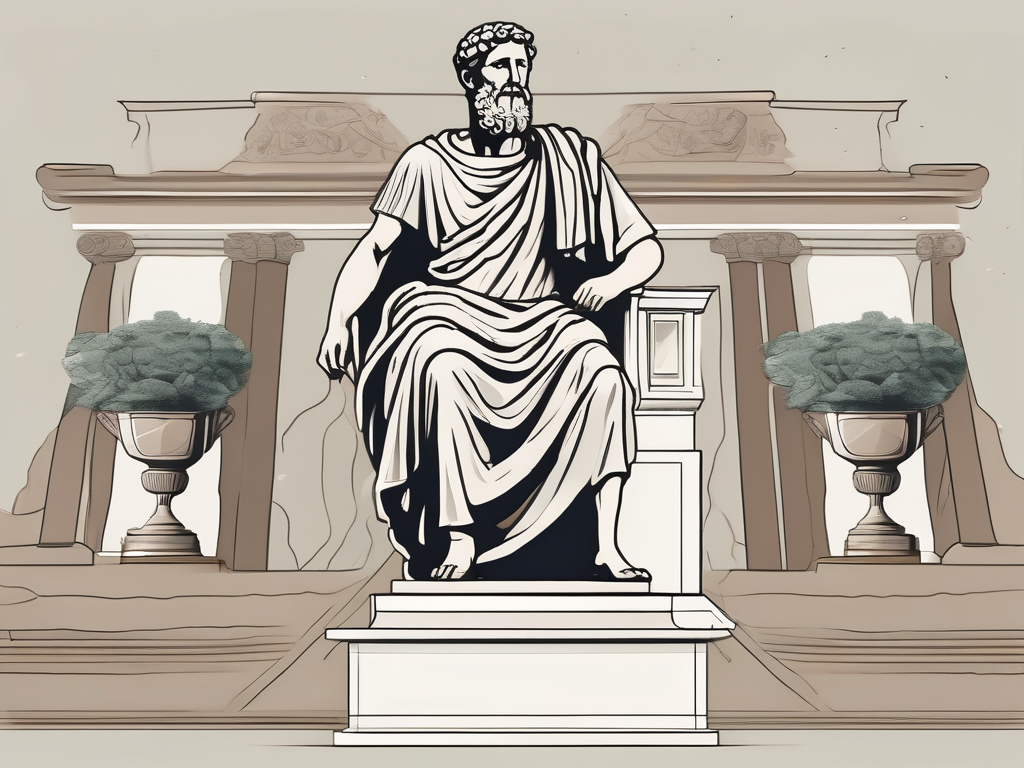Stoicism is an ancient philosophy that has stood the test of time. Its principles provide a practical framework for tackling the challenges of life and finding inner peace. In this comprehensive guide, we will delve into the core principles of Stoicism, explore its origins and key philosophers, examine its application in emotion management and everyday life, and address common criticisms and misconceptions.
Understanding Stoicism
Stoicism is a philosophical school of thought that originated in ancient Greece around 300 BCE. Founded by Zeno of Citium, Stoicism gained popularity in Rome during the time of Marcus Aurelius, Epictetus, and Seneca. However, its influence extends far beyond these notable figures, as Stoic teachings can also be found in the works of other renowned philosophers such as Socrates and Plato.
The roots of Stoicism can be traced back to Zeno of Citium, who laid the foundation for this philosophical school. Zeno believed that the path to happiness and tranquility lies in living in accordance with nature and reason. He taught that individuals should focus on what they can control, namely their thoughts and actions, rather than being consumed by external circumstances beyond their influence.
The Origins of Stoicism
The origins of Stoicism can be further explored by examining the historical context in which it emerged. Ancient Greece, known for its rich intellectual and philosophical traditions, provided fertile ground for the development of various schools of thought. It was a time of great intellectual exploration, with thinkers like Socrates and Plato challenging conventional wisdom and seeking to understand the nature of reality and human existence.
During this period, Zeno of Citium, inspired by the teachings of Socrates and the Cynic philosophers, sought to develop a philosophy that would provide individuals with a practical guide to living a virtuous and fulfilling life. He drew upon the ideas of previous philosophers, incorporating elements of Cynicism and Megarian philosophy into his own teachings.
Key Philosophers of Stoicism
Stoicism, as a philosophy, has been shaped and enriched by the wisdom of many philosophers throughout history. While Zeno of Citium laid the foundation for Stoic philosophy, subsequent thinkers expanded upon his ideas and contributed to its development.
One of the key figures in Stoicism is Epictetus, a former slave who became a prominent philosopher. Epictetus emphasized the importance of the mind and its ability to control our reactions to external events. He believed that individuals have the power to choose their perspective and response to any situation, regardless of the circumstances. This emphasis on personal agency and the power of the mind is a fundamental aspect of Stoic philosophy.
Another influential Stoic philosopher is Marcus Aurelius, the Roman emperor who ruled from 161 to 180 CE. Marcus Aurelius is known for his personal diaries, known as Meditations, in which he reflects on Stoic principles and their practical application in daily life. His writings provide valuable insights into the Stoic approach to virtue, resilience, and the pursuit of inner peace amidst the challenges of leadership and the complexities of the world.
These are just a few examples of the many philosophers who have contributed to the development and understanding of Stoicism. Each philosopher brings their own unique perspective and insights, enriching the philosophy and offering different approaches to living a virtuous and fulfilling life.
The Core Principles of Stoicism
The Principle of Acceptance
Acceptance is at the heart of Stoicism. It teaches us to embrace the things we cannot change and focus on what is within our control. By accepting the impermanence of life and the inevitability of change, we can find peace and serenity amidst chaotic circumstances.
When we practice acceptance, we acknowledge that there are certain aspects of life that are beyond our influence. We understand that fighting against these uncontrollable factors only leads to frustration and disappointment. Instead, Stoicism encourages us to redirect our energy towards what we can control – our thoughts, actions, and attitudes.
By accepting the imperfections and uncertainties of life, we free ourselves from the burden of unrealistic expectations. We learn to let go of the desire for things to be different and find contentment in the present moment. This acceptance allows us to approach challenges with a calm and rational mindset, enabling us to make better decisions and find creative solutions.
The Principle of Objectivity
Stoicism encourages us to view the world objectively, detached from our personal biases and emotions. By stepping back and observing situations with clarity and rationality, we can make better decisions and avoid unnecessary suffering caused by letting our emotions cloud our judgment.
When we practice objectivity, we strive to see things as they truly are, rather than how we wish them to be. This requires us to examine our own biases and preconceptions, recognizing that our subjective experiences can color our perception of reality. By cultivating a sense of detachment, we can gain a clearer understanding of the world and make more informed choices.
Objectivity also allows us to navigate conflicts and disagreements with greater ease. Instead of becoming entangled in emotional reactions, we can approach disagreements with an open mind and a willingness to listen. By seeking to understand different perspectives, we can foster empathy and find common ground, leading to more harmonious relationships.
The Principle of Self-Discipline
Self-discipline is a cornerstone of Stoicism. It urges us to cultivate inner strength and strive for self-improvement. Through self-discipline, we gain control over our thoughts and actions, allowing us to respond to challenges with resilience and fortitude.
When we practice self-discipline, we commit ourselves to living in alignment with our values and principles. We recognize that true freedom comes from mastering our own desires and impulses. By exercising self-control, we can resist the temptations of instant gratification and make choices that align with our long-term goals.
Self-discipline also empowers us to overcome obstacles and setbacks. Instead of being overwhelmed by adversity, we can approach challenges with a determined mindset. By embracing discomfort and pushing through difficulties, we develop resilience and grow stronger in the face of adversity.
Furthermore, self-discipline allows us to cultivate habits and routines that support our well-being and personal growth. By consistently practicing positive behaviors, such as meditation, exercise, and reflection, we can enhance our mental and emotional well-being. Through self-discipline, we create a solid foundation for personal development and fulfillment.
Stoicism and Emotion Management
Stoicism, an ancient philosophy developed in Greece, offers valuable insights into managing our emotions and leading a more fulfilling life. This philosophy teaches us to acknowledge and accept negative emotions without being overwhelmed by them. Rather than suppressing or avoiding these emotions, Stoics believe in understanding their root causes and responding with wisdom and virtue.
One of the key principles of Stoicism is the concept of “amor fati,” which translates to “love of fate.” This principle encourages individuals to embrace all aspects of their lives, including the negative emotions that arise. By reframing our perspective, we can transform negative emotions into valuable opportunities for growth and self-discovery.
Stoics believe that negative emotions, such as anger, fear, and sadness, are often a result of our own judgments and interpretations of events. By examining these judgments and challenging their validity, we can gain a deeper understanding of ourselves and the world around us. This process of self-reflection allows us to respond to negative emotions with wisdom and virtue, rather than being consumed by them.
The Stoic Approach to Negative Emotions
When faced with negative emotions, Stoics advocate for a process of self-inquiry and introspection. By asking ourselves why we feel a certain way and examining the underlying beliefs and assumptions that contribute to these emotions, we can gain clarity and insight.
For example, if we find ourselves feeling angry towards someone, Stoicism encourages us to explore the reasons behind our anger. Are we judging their actions unfairly? Are we expecting them to behave in a certain way that aligns with our own desires and expectations? By questioning our own judgments and expectations, we can begin to detach ourselves from the negative emotions and approach the situation with a more rational and compassionate mindset.
Stoics also emphasize the importance of accepting the things that are beyond our control. By recognizing that we cannot change certain external circumstances, we can focus our energy on what is within our control – our own thoughts, attitudes, and actions. This shift in perspective allows us to let go of negative emotions that arise from trying to control the uncontrollable.
Cultivating Positive Emotions Through Stoicism
Stoicism not only helps us navigate negative emotions but also emphasizes the importance of cultivating positive emotions. By practicing gratitude, mindfulness, and maintaining a focus on what truly matters, we can experience a deeper sense of contentment and joy in our lives.
Gratitude is a central aspect of Stoic philosophy. By regularly reflecting on the things we are grateful for, we can shift our attention away from negative emotions and towards the positive aspects of our lives. This practice helps us develop a greater appreciation for the present moment and cultivates a sense of abundance and fulfillment.
Mindfulness, another key component of Stoicism, involves being fully present and aware of our thoughts, emotions, and sensations. By practicing mindfulness, we can observe our emotions without judgment or attachment, allowing them to arise and pass away naturally. This non-reactive stance towards our emotions helps us maintain a sense of calm and equanimity, even in the face of challenging situations.
Lastly, Stoicism encourages us to focus on what truly matters in life – our values, virtues, and relationships. By aligning our actions with our core values and virtues, we can experience a deeper sense of purpose and fulfillment. This alignment also helps us prioritize meaningful relationships and invest our time and energy in nurturing them, leading to greater happiness and satisfaction.
In conclusion, Stoicism offers a profound approach to managing our emotions. By acknowledging and accepting negative emotions, reframing our perspective, and cultivating positive emotions, we can lead a more balanced and fulfilling life. The principles of Stoicism provide us with practical tools and insights that can help us navigate the complexities of our emotional landscape and find greater peace and contentment.
Stoicism in Everyday Life
Stoicism, an ancient philosophy that originated in Greece, has gained popularity in recent years for its practical approach to living a meaningful and fulfilling life. While often associated with a stoic demeanor and the suppression of emotions, Stoicism is much more than that. It is a philosophy that can greatly enhance our personal relationships and professional lives by teaching us valuable lessons in communication, empathy, and resilience.
Applying Stoicism in Personal Relationships
In our personal relationships, Stoicism can be a guiding principle that helps us navigate the complexities of human interaction. By embracing the core tenets of Stoicism, such as focusing on what we can control and accepting others for who they are, we can foster healthier and more fulfilling connections.
Effective communication is a cornerstone of any successful relationship, and Stoicism can provide valuable insights into this aspect of our lives. By practicing active listening and expressing ourselves with clarity and compassion, we can create an environment of understanding and empathy.
Furthermore, Stoicism teaches us the importance of managing our expectations. By letting go of unrealistic expectations and accepting people for who they truly are, we can avoid unnecessary disappointment and frustration. This mindset shift allows us to appreciate others for their unique qualities and strengths, fostering deeper connections and more meaningful relationships.
Stoicism in the Workplace
Stoic principles are not limited to personal relationships; they can also be applied to our professional lives. In the fast-paced and often stressful world of work, Stoicism can provide us with the tools to navigate challenges and achieve greater success and fulfillment.
One of the key teachings of Stoicism is the acceptance of challenges as opportunities for growth. Instead of viewing difficulties as setbacks, Stoicism encourages us to embrace them as chances to develop our skills and character. By adopting this mindset, we can approach work-related challenges with a sense of curiosity and resilience, ultimately leading to personal and professional growth.
Self-discipline is another crucial aspect of Stoicism that can greatly benefit us in the workplace. By practicing self-control and focusing on our goals, we can resist distractions and maintain a strong work ethic. This discipline allows us to stay on track and achieve our desired outcomes, even in the face of adversity.
Moreover, Stoicism teaches us to focus on what we can control. In a work environment where external factors often seem overwhelming, this principle can be particularly valuable. By directing our energy towards the aspects of our work that we have influence over, we can avoid wasting time and effort on things beyond our control. This shift in mindset empowers us to make meaningful contributions and find satisfaction in our professional endeavors.
In conclusion, Stoicism offers a practical and insightful framework for navigating the complexities of everyday life. Whether in personal relationships or the workplace, the principles of Stoicism can guide us towards healthier connections, greater resilience, and a more fulfilling existence. By embracing these teachings, we can cultivate a sense of inner peace and purpose, leading to a life well-lived.
Criticisms and Misconceptions of Stoicism
Addressing Common Misunderstandings
Stoicism is often misunderstood as a philosophy that advocates for emotional suppression or indifference. In reality, Stoics are encouraged to engage with life fully and experience a range of emotions while maintaining an objective perspective. By clarifying these misconceptions, we can gain a deeper appreciation for the true essence of Stoicism.
Responding to Criticisms of Stoicism
Like any philosophy, Stoicism is not without its critics. Some argue that it promotes passivity or denies the importance of human emotions. However, Stoics maintain that their philosophy is about embracing the present moment, acknowledging our emotions, and using reason to guide our actions. By addressing these criticisms, we can better understand the practical and impactful nature of Stoic teachings.
In conclusion, Stoicism offers a comprehensive framework for living a meaningful and fulfilling life. By understanding its core principles, applying them in our interactions, and managing our emotions, we can cultivate resilience, inner peace, and a deeper sense of purpose. Despite criticisms and misconceptions, Stoicism remains a timeless philosophy that continues to provide wisdom and guidance in our modern world. So, embrace the pillars of Stoicism and embark on a journey of self-discovery and personal growth.












